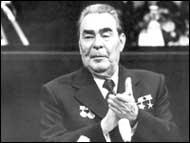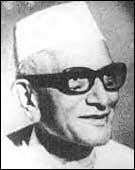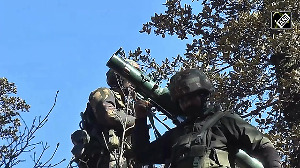Soviet officials of the Brezhnev era kept foreign diplomats amused during after dinner conversations with apocryphal stories about the Communist czar, who dominated their lives. The old lady seemed impressed, but sad. He drove her in his black Zil (a limousine specially manufactured for the top Soviet leadership) to his dacha outside Moscow and then to a Soviet garrison, where generals lined up to pay obeisance. Still, no smile appeared on her face. On the return to his apartment, Brezhnev asked her why she did not seem happy about her son's great accomplishments. Was there anything that troubled her? "Indeed, my son," the old lady spoke finally, "I am very proud of what you have achieved, but I dread to think what will happen to you when the Bolsheviks return!" I was technically a guest of President Brezhnev in a luxurious Kremlin suite when I visited Moscow in 1979 as a member of the official delegation, which accompanied Prime Minister Morarji Desai. Brezhnev had already passed his prime and was showing signs of senility. I dreaded to think that he had his fingers on the nuclear button, but someone confided in me that he had only fake buttons at his bedside. Brezhnev's health was a matter of speculation for years: Several journalists had made a vocation of it. Parayil Unnikrishnan, a veteran Indian journalist based in Moscow, had put his credibility at stake by reporting more than three years earlier by reporting that Brezhnev had 'taken leave of his responsibilities.' The report made headlines around the globe with obituary notes. When Brezhnev reappeared several weeks later after 'a bout of flu', Unnikrishnan claimed that his report was that Brezhnev had merely gone on leave, thanks to the careful wording he had used. Apparently, a high source in the Communist Party had planted the story on Unnikrishnan. Morarji Desai was never an admirer of the Soviet Union, but as the prime minister, he had discovered the importance of Indo- If anything, he treated them with his characteristic sense of moral superiority. Brezhnev may not have met an Indian with less reverence for the Soviet Union and its leadership. Desai's reaction to a proposal to send an Indian on a Soviet space ship shocked both the Indian and Soviet delegations. Following his script closely, Brezhnev made the offer with a flourish at the second round of talks with Desai. In view of the close and cordial relationship between the two countries, an Indian would be invited to join the Soviet crew of a space ship. He recalled that two other fraternal countries had already participated in such friendship flights and an Indo-Soviet space flight would be a giant step. Brezhnev paused and put a cigarette between his lips and proceeded to light it, awaiting a response. "I do not think it is a good idea", said Desai without batting an eyelid. As the Soviet interpreter quickly translated the response, Brezhnev's cigarette, not yet lit, fell on the table. He turned to Kosygin and asked whether he had heard it right that the Indian prime minister was not in favour of a friendship flight. Kosygin mumbled something in sheer disbelief and asked his 'sputniks' (Russian word for junior colleagues) whether they had obtained Indian clearance beforehand and all of them nodded in the affirmative. The Indian delegation was no less stunned. Slips were passed on to the prime minister about the consultations that had taken place that very morning between the officials on both sides. But Desai did not even care to read them. Kosygin, having recovered from the shock, decided to take the bull by the horns. "But, may I ask, prime minister, why?" he said, hesitatingly. Desai had any number of reasons. First of all, the Indian would not learn anything by being merely sent up to space in a Soviet ship. He would just be a passenger. Moreover, selection of the right person for the flight would be difficult. In fact, several people would have to be trained for the flight and only one person would fly eventually. The others would be wasting their time. As he said all this, he did not look at his own colleagues even once. Kosygin was speechless. So was Brezhnev, whose script did not have the material to counter the Indian prime minister. Once he is supposed to have addressed Mrs Indira Gandhi as Mrs Thatcher. When he was told that it was Mrs Gandhi, he said: "I know that, but my script says it is Mrs Thatcher". How would he, then, say anything outside the script? After a quick consultation with Kosygin, he moved on to the next item on the agenda. At the end of the visit, we trooped into one of the grand halls of the Kremlin to celebrate another milestone in Indo-Soviet relations. Brezhnev was at his convivial best and invited Desai to have some tea. "On such occasions, we normally toast with vodka. But considering your views on such matters, we have decided to serve only tea", he said. Desai's response was abrupt: "I gave up drinking tea 40 years ago", he said. Brezhnev was completely taken aback, but he laughed it off and escorted Desai to the buffet and said: "I know you are a vegetarian. I hope you have enough vegetables to eat." Desai did not react, but after a while, he made a profound remark: "Isn't it interesting that you non-vegetarians eat only vegetarian animals?" Brezhnev was completely floored. He looked totally lost. The only one who came to his rescue was M V Oak, the Indian interpreter, known for his unconventional ways. "What my prime minister meant was that you eat only cows, pigs and sheep, which are vegetarian animals, not lions and tigers". Brezhnev appeared even more confused, but chose not to probe any further. Brezhnev at that time was younger than Desai, but appeared more senile. His attention span was short and his mind appeared to wander. Compared to him, Desai was robust, upright and alert. Desai ceased to be prime minister soon after his return, but he outlived Brezhnev and the Soviet Union. Brezhnev's effective leadership of the Soviet Union from 1964 to 1982 was longer than any other leader except Stalin. His career linked the age of Stalin and Khrushchev to the age of Gorbachev, having initiated the détente era. His personality cult had reached its peak in 1976 and he continued his collection of medals (114 at the last count) till he passed away in 1982. Brezhnev in the Kremlin is a lasting memory for me, not having seen Moscow without the large portraits of Brezhnev staring from every wall. According to one such story, Brezhnev invited his aged mother to the Kremlin to show off his power and wealth. He guided her through the gilded halls of the Kremlin, his garage packed with glittering automobiles and his opulent private apartment.
According to one such story, Brezhnev invited his aged mother to the Kremlin to show off his power and wealth. He guided her through the gilded halls of the Kremlin, his garage packed with glittering automobiles and his opulent private apartment. Soviet relations and decided to visit Moscow. He was politically correct in his interaction with the Brezhnev-Kosygin duo, but he was not overawed by them.
Soviet relations and decided to visit Moscow. He was politically correct in his interaction with the Brezhnev-Kosygin duo, but he was not overawed by them.





